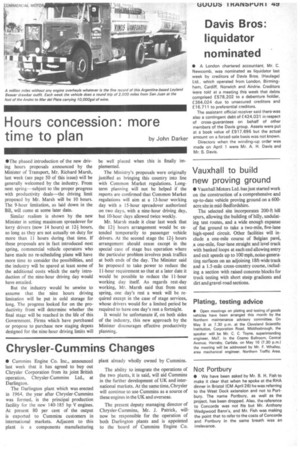Hours concession: more
Page 51

If you've noticed an error in this article please click here to report it so we can fix it.
time to plan by John Darker *The phased introduction of the new driving hours proposals announced by the Minister of Transport, Mr. Richard Marsh, last week (see page 50 of this issue) will be generally welcomed by the industry. From
next spring subject to the proper progress with productivity deals—the driving limit proposed by Mr. Marsh will be 10 hours. The 9-hour limitation, as laid down in the Bill, will come at some later date.
Similar realism is shown by the new Minister in setting maximum spreadover for lorry drivers (now 14 hours) at 121 hours, so long as they are not actually on duty for more than 11 hours during that time. If these proposals are in fact introduced next spring, commercial vehicle operators who have made no re-scheduling plans will have more time to consider the possibilities, and the industry will be spared at least some of the additional costs which the early introduction of the nine-hour driving day would have entailed.
But the industry would be unwise to assume that the nine hours driving limitation will be put in cold storage for long. The progress looked for on the productivity front will determine whether the final stage will be reached in the life of this Government. Firms which have purchased or propose to purchase new staging depots designed for the nine-hour driving limits will
be well placed when this is finally implemented.
The Ministry's proposals were originally justified as bringing this country into line with Common Market regulations. Longterm planning will not be helped if the reports are confirmed that Common Market regulations will aim at a 13-hour working day with a 15-hour spreadover authorized on two days, with a nine-hour driving day, but 10-hour days allowed twice weekly.
Mr. Marsh made it clear last week that the 121 hours arrangement would be extended temporarily to passenger vehicle drivers. At the second stage the 124 hours arrangement should cease except in the special case of stage bus operation where the particular problem involves peak traffics at both ends of the day. The Minister said he proposed to take power to reduce the 11-hour requirement so that at a later date it would be possible to reduce the 11-hour working day itself. As regards rest-day working, Mr. Marsh said that from next spring, one day's rest a week will be required except in the case of stage services, whose drivers would for a limited period be required to have one day's rest a fortnight.
It would be unfortunate if, on both sides of the industry, this new approach by the Minister discourages effective productivity planning.




































































































































































































































